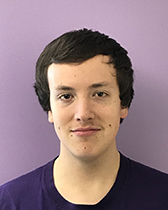
Student Spotlight: Nils Strand
Nils Strand is a graduate student in the Gingrich group whose specialty is in nonequilibrium statistical mechanics. His interest in studying how minute random fluctuations shape various macroscopic nonequilibrium phenomena has led him to research involving the efficient modeling of stochastic systems, the construction of efficient numerical methods, and the development of analytical theories.
How did you become interested in your research?
I consider much of my research at Northwestern with Prof. Todd Gingrich, related to nonequilibrium statistical mechanics, to be rather fundamental. I have enjoyed understanding chemical and physical phenomena from a bottom-up approach. I typically model such phenomena using simple enough toy models for exact solutions to be attainable either by hand or via computations. My research passions have especially grown recently as I am discovering ways of applying my acquired knowledge of toy models and numerical methodologies to bigger, larger-scale problems, in chemistry and biophysics.
Is there a professor that has made an impact on your academic career?
I owe much credit to my two main advisors as an undergraduate and Ph.D. student, Profs. Paul Zimmerman and Todd Gingrich, respectively. Prof. Zimmerman was the first to introduce me to advanced numerical methodology, which I used at the time to solve chemical kinetics problems and uncover intricate chemical reaction mechanisms. Prof. Gingrich has been an invaluable mentor to me and has done an impeccable job teaching me various skills in statistical mechanics, work ethics, manuscript and proposal writing, to name a few.
What has been the highlight of your academic career thus far?
It is difficult to select precisely one event in my academic career that has been the most fruitful for me. However, a prime example has to be my various presentations of my PhD research at several conferences, including ones in Europe. Not only have I enjoyed disseminating my newly acquired knowledge, but I have also been very fortunate to network with an international pool of brilliant scientists.
How would you explain what you study to non-scientists?
My current interests lie in understanding how rare events impact pattern formation in living systems, in which stochastic noise plays an important role. In particular, I am elucidating signaling cascades that can trigger transitions between metastable states in genetic switches.
Tell us more about the research you are conducting in Professor Gingrich’s Lab.
I am in the process of combining concepts from transition path theory with linear algebra-based numerical methodologies centered around sparse matrices and, in very high-dimensional cases, tensor networks, to compute properties of metastable transitions, such as transition rates, and reactive pathway ensembles. Transition path theory attempts to isolate subsets of trajectories corresponding to so-called reactive paths, i.e., trajectories moving from metastable region A to another metastable region B without returning to A in between. A principal advantage of this formalism is to render the rare events more typical, therefore significantly speeding up the relevant simulations. Tensor networks attempt to compress high-dimensional data in terms of decompositions into lower-dimensional (lower rank) subsets of data ("tensors") to provide efficient, and still accurate, approximations of mathematical functions relevant to the system.
I am very grateful to the close-knit community that the Gingrich group has become. I am never afraid to ask science-related questions to any other member of the group, and I have also enjoyed spending time with each one outside of the work and science setting. I, for instance, have regular meals with other group members. Prof. Gingrich himself has been crucial to my prosperity as a graduate student. He genuinely cares about the success of each student and ensures that he is seen by his students as a colleague rather than a boss, providing them with just the right amount of autonomy with regard to the research topics on which they choose to embark.
Where do you hope to be in your career in the next 10 years?
In 10 years, I hope to follow in the footsteps of my current advisor, who himself is soon up for tenure here at Northwestern, and immerse myself in the academic community somewhere in the U.S. or elsewhere. Observing the process Prof. Gingrich has been going through in these last few years and my upcoming postdoctoral appointment at UChicago have particularly strengthened my desire for a long-term academic position.
What is a hobby or activity you do outside of your work in chemistry?
Outside of science and research, I have been an active member of Northwestern's Philharmonia orchestra since 2018. My instrument is the violin and I have been playing it since I was 6 years old.
